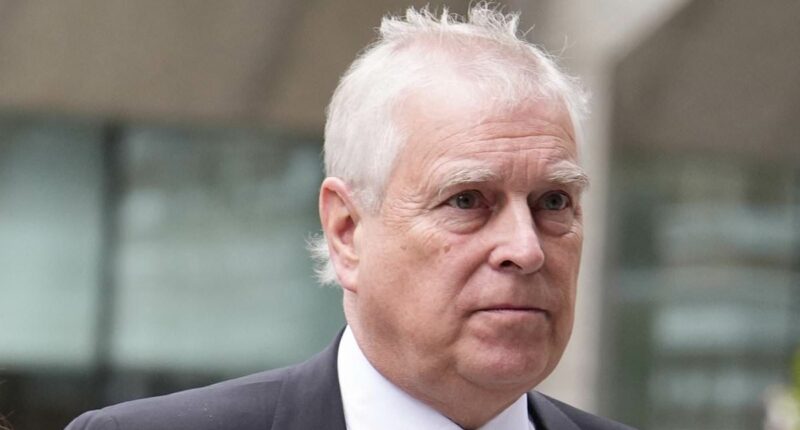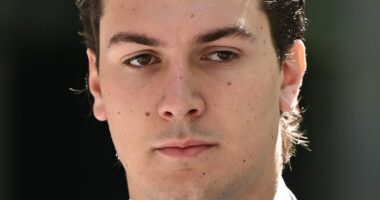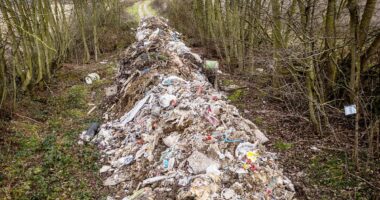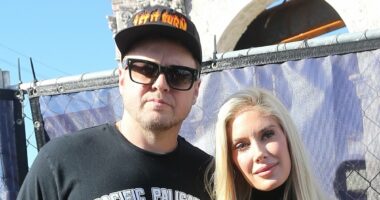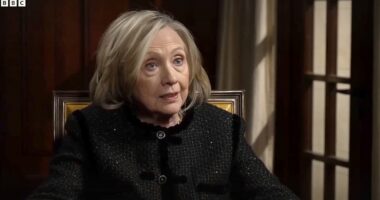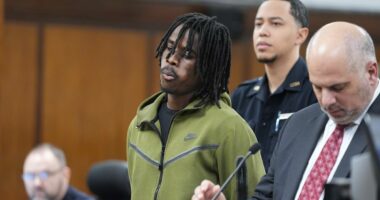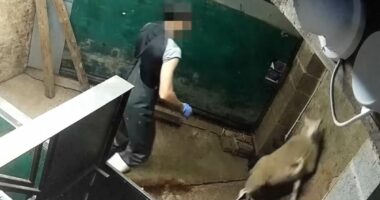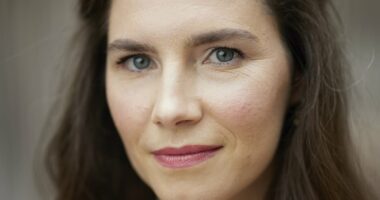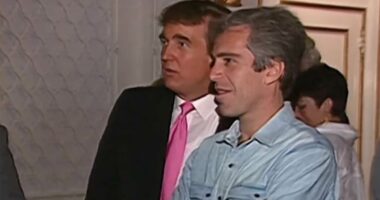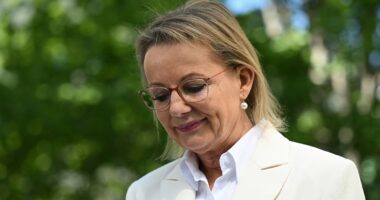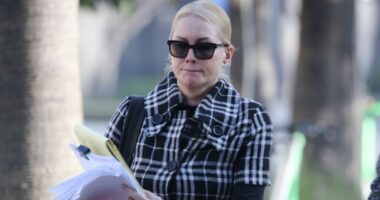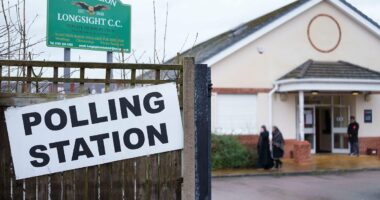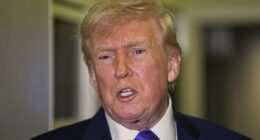Share this @internewscast.com
In a groundbreaking new release, royal commentator Robert Jobson delves into the enduring impact of the Windsor family. In the inaugural segment of our special series with The Mail on Sunday, he uncovered the extent of the Queen’s outrage towards Harry and Meghan. Today, the focus shifts to Andrew’s extravagant habits…
According to a high-ranking Palace official, Andrew’s penchant for massages during his travels was well-known, with a preference for attractive women.
During a business trip to New York, he instructed an aide to arrange a massage in his hotel room. However, when the therapist arrived and didn’t meet his expectations due to her larger size, he dismissed her swiftly.
In 2000, Andrew threw a celebration at Sandringham for the now-deceased financier and convicted sex offender Jeffrey Epstein, along with his partner Ghislaine Maxwell, purportedly marking her 39th birthday.
A Palace insider reported that staff were taken aback to find the bathrooms equipped not only with standard toiletries but also with items like lubricant, condoms, and poppers—substances used to heighten sexual experiences.
Despite Andrew’s fall from grace, the late Queen remained devoted to her second son, continuing to offer her unwavering support.
In her final days she kept him close, shielding him as Palace insiders continued to push for his total exile.
She confided her support to a trusted confidant: ‘You have to remember, he is my son.’
It was Charles who, after Andrew’s disastrous Newsnight interview, had insisted to his mother that his brother be cut adrift. The Palace subsequently issued an announcement on November 20, 2019, saying that Andrew was stepping back from public duties voluntarily, with the Queen’s permission.

Ghislaine Maxwell and Jeffrey Epstein on a pheasant shoot with Andrew in December 2000
Two years later, when news broke of Virginia Giuffre’s impending lawsuit against Andrew, Palace power brokers decided it was time to pull the plug completely, withdrawing all of his patronages and military titles.
In order to soften the blow, the Queen arranged to have a private one-to-one meeting with her son – but senior courtiers intervened and insisted they be present to witness the conversation.
When Andrew arrived, he was blind-sided to find himself confronted not just by his mother, but also by Sir Edward Young, her private secretary, and Sir Michael Stevens, Keeper of the Privy Purse. It was a painful moment for both mother and son.
With the Queen’s death in 2022, Andrew lost his strongest ally.
Since then, the King has been considering how he could make him leave Royal Lodge, the Windsor mansion that had once been the Queen Mother’s residence – which he has now, of course, achieved.
What Andrew doesn’t know is that the King toyed with the idea that Royal Lodge would be a perfect residence for Camilla, should he predecease her.
And what the King doesn’t know, is that Andrew had the bedroom where their beloved grandmother died converted into a cinema.

Undated photo of Andrew, Virginia Giuffre, and Ghislaine Maxwell posing for a photo
Since succeeding to the throne, King Charles has had one or two unpleasant surprises – and he’s been swift to institute changes.
One of these was to cease shelling out enormous sums to his brother, Prince Andrew.
Incredibly, the disgraced Prince had asked the King to pay £32,000 for Indian spiritual gurus to treat him – at a time when the gurus were all staying with Andrew at Royal Lodge, his mansion in Windsor Park.
Horrified, Charles refused. His mother, however, had previously waved through such payments for Andrew.
The late Queen was 96 when she died, but despite her great age Charles was hit very hard. Only those close to him knew just how deeply he grieved – or how much control was required immediately after her death to shift into ‘autopilot’.
Much as he admired his mother’s approach to her royal duties, however, he was determined to make changes. Some involved cutting costs, which we will return to later in this book serial.
Others, arguably more trivial, involved valuable paintings and drawings. He was aghast, for instance, to be told in passing that treasured works of art were adorning the private quarters of staff members. Did anyone even know who had what in whose bedroom? After going on a room-by-room personal inspection, the King ordered an inventory to be made. Then he had all the artworks removed.
He was also distinctly unimpressed by the sheer number of equine paintings, favoured by the Queen, that decorated the Royal Family’s quarters at Sandringham, Balmoral and Windsor Castle.
Down they came – and, at the King’s command, they were replaced with pictures of Roman ruins or paintings of beautiful Bedouin girls by famous Arabian artists.
Some of the other changes the King has made are linked to his genuine concern for the environment. Already he has turned down the heating of the indoor pool at Buckingham Palace, swapped old light bulbs for LEDs and ensured no lights remain on unnecessarily.
Certainly, no environmental infraction, however small, seemed to escape his eagle eye when he was the Prince of Wales. Some staff and former aides believe that he still sometimes shows traits of obsessive compulsive disorder (OCD).
Sir Malcolm Ross, one of the late Queen’s most senior and long-serving courtiers, was stunned by the flood of weekend calls he received when he moved across to become Prince Charles’s Master of the Household. He received more calls from the Prince in the first weekend of his new job, he told staff, than during his entire time working for the Queen.

Andrew with King Charles at the funeral of Katharine, Duchess of Kent, on September 2025
One such princely instruction, said a senior royal source, was to remind staff to turn
off the tap while brushing their teeth. A servant was once even scolded for running a bath too high. Such edicts have not always proved popular with staff, who point out that Charles’s seven cars were washed daily by the chauffeurs.
These cars are constantly shuffled around the country to be available for his engagements. Even now, the King is under the illusion that only one electric car is driven in advance to his next destination. The truth is that, owing to their limited range, two cars often have to be deployed – with the first driven to a meeting point where a second identical electric car stands ready to continue the journey.
Nor is Charles averse to using cars for reasons some might feel were unnecessary, given his views on the parlous state of the planet. Insiders say he has insisted in the past on a one-night trip to Highgrove, his country home, simply to see the wild meadow in bloom. Naturally, his chef, butler, valet, personal assistant and police convoy followed along.
One former servant said: ‘It’s one rule for him, another for everyone else.’
He’s spent most of his life as a king in waiting, so he can perhaps be forgiven for being more conscious than most of his own importance. Some former staff members say surviving under ‘The Boss’ – King Charles – requires a touch of sycophancy, pointing out that those who fail to show the due deference he expects rarely end up sticking around.
This is by no means a new trait. There was a telling occasion in July 2006, when Queen Elizabeth decided to celebrate her 80th birthday with her immediate family on a private cruise of the Scottish Isles aboard the Hebridean Princess.
Unlike the decommissioned royal yacht Britannia, the former car-ferry-turned-luxury-vessel had only one dining room, meaning royals and staff had to muck in.
The Queen was told, that to avoid a clash, staff would have to eat after the Royal Family had finished. But with her instinctive consideration for others, she insisted that both groups dine together, albeit on opposite sides of the room. Royals and staff also shared the breakfast buffet.
While the Queen and Prince Philip were content with this arrangement, Prince Charles, who joined the voyage two days late, was less than pleased.
‘There is a hierarchy, and he likes to stick to it. He is very Edwardian – upstairs, downstairs – like that,’ said a senior Household source. A small addendum to the story of this cruise reveals a lot about the Queen, who never took the good will of her subjects for granted.
The Hebridean Princess’s smaller size had allowed it to access coves and beaches that the Britannia had been unable to reach, giving Prince Philip the chance to plot a course to visit locations he’d long wanted to explore. At one remote beach, the royal bodyguards, Dick Griffin and Tim Nash, arrived ahead of the party to carry out a reconnaissance, and encountered a family already relaxing there.
Politely, they asked them to respect the privacy of the Royal Family. The family complied and refrained from taking any photos – just as well for Charles, as they later spotted him changing out of his wet swimming trunks.
And that might have been that. But afterwards, the Queen sent one of her protection officers over to the family with a gift in gratitude for their respect. The father accepted it graciously, though he remarked that no one would ever believe what had just happened.
How true are the stories about Charles, as Prince of Wales, insisting on travelling with his own loo seat and generally insisting on far more grandeur than his parents?
Ten years ago, the public winced at reports – never confirmed – that his valets squeezed exactly one inch of toothpaste on to his brush, pressed his pyjamas daily, ironed his shoelaces and ran his bath to a precise temperature. It all fed a portrait of pampered detachment.
For Charles and his team, the headlines stung. Winning over the public would not be easy, they concluded.
Three years later, the biographer Tom Bower revealed in his book Rebel Prince that Charles took his own loo seat on official tours. But when challenged about this, during a 2018 walkabout in Brisbane, Australia, the Prince himself dismissed the claim, saying: ‘Oh, don’t believe all that crap.’

The late Queen Elizabeth with Andrew on the Buckingham Palace balcony during Trooping The Colour in June 2019
However, insiders suggest there is some truth to the story.
At Craigowan Lodge, a rustic stone cottage about a mile from Balmoral Castle, his servants would swap the existing cheap plastic loo seat – which Charles couldn’t stand – for a wooden one whenever he came to stay.
Once, however, they forgot to change it back at the end of his stay. Calamity! Prince Philip was expected shortly at the lodge and would undoubtedly notice.
So an aide was dispatched back to Craigowen from Highgrove, a drive of 500 miles taking around nine hours by car.
The aide’s task? To replace the solid wood lavatory seat with the original flimsy plastic one before the old duke arrived, thus avoiding an inevitable clash between father and son.
A military man to the core, the Duke of Edinburgh – while loving his eldest son dearly – was prone to bristle at what he considered Charles’s over-indulgent lifestyle.
Philip’s own preference was to travel light, with just one aide and a police protection officer who often had a suit carrier slung over his back.
In stark contrast, Charles usually had a large retinue and extensive luggage.
Charles ended up going to some lengths to dodge his father’s stinging remarks. So when they travelled together on a royal flight, he’d always let Philip disembark first. That way, he could avoid his father’s critical eye and the inevitable rebuke that followed after Philip had seen staff off-loading Charles’s mountain of luggage.
At Sandringham, a footman was tasked with bringing to the table a big holdall, known as the ‘breakfast bag’, which was tightly packed with ingredients for Charles’s special breakfasts.
Questioning the need for this, Philip would point out that the chefs on tap prepared meals that were, as he put it, ‘bloody good enough for the rest of us.’
It was another example of idiosyncratic indulgence that Philip couldn’t abide.
Sometimes he turned his disapproval into a joke.
One day at Balmoral, he noticed that special cushions had been put out in the drawing room not only for Charles, who has suffered from chronic lower back pain for years, but for Camilla, too. ‘Oh, don’t tell me it’s catching,’ said Prince Philip dryly.
Back pain isn’t the only affliction that beset Charles when he was Prince of Wales. He also worried about his energy levels flagging, and sometimes found himself struggling to keep his eyes open.
In a BBC documentary, Prince Harry revealed that his father would often work late into the night, sometimes falling asleep at his desk. Charles would later be found with papers stuck to his face.
This was due not only to his busy work schedule, but – as he eventually discovered – to the fact that he was suffering from draining sleep apnoea.
A potentially serious disorder in which breathing repeatedly stops for a few moments, it deprives people of the deep restful stage of sleep. As a direct consequence, they suffer from exhaustion and poor concentration.
Fortunately, Charles’s life and energy levels improved dramatically after he started using a Continuous Positive Airway Pressure (CPAP) machine, which involves wearing a mask connected by a tube to a motor that delivers steady air pressure to keep airways open.
He’d been introduced it by Al Gore, then the US vice president, when he was invited to Highgrove in 2006.
Even today, all these years later, Charles still swears by his precious CPAP machine – though it does mean that he and Camilla sometimes sleep apart.

Elizabeth arrives with Captain Michael Hepburn to embark on the Hebridean Princess at Port Ellen on Islay for a week-long cruise with her family to celebrate her 80th birthday

Charles on board the Hebridean Princess as it arrives in Stornaway on the island of Lewis at the end of the cruise
When Queen Elizabeth II died, her death certificate stated ‘old age’ as the cause of her death. However, death in advanced years is typically due to another condition that’s exacerbated by age.
In fact, as Boris Johnson revealed in his 2024 memoir, Unleashed, she’d been stoically battling multiple myeloma, a form of bone-marrow cancer, in the year leading up to her death.
No one was shocked. It had already been revealed by another author that she’d had some form of myeloma. But King Charles is understood to have been irritated that Boris had confirmed the exact nature of her disease.
Indeed, he’d often found the flamboyant former politician exasperating.
Even a king, of course, is entitled to his personal views of politicians. The problem with Charles is that – unlike his mother – he has not always been discreet.
Skating close to thin ice, he once said: ‘I don’t see why politicians should think they have the monopoly of wisdom.’
His confidants know he was no fan of Tony Blair’s closeness to George W. Bush during the 2003 Iraq War. The prime minister, Charles thought, had squandered a chance to build Arab consensus, leaning instead on the ‘terrifying’ Bush administration.
Behind closed doors, he called Blair ‘Bush’s poodle’, criticising him for brushing off Arab advice and ignoring intelligence that challenged the case for war.
Presciently, Charles also called Western-style democracy in Iraq a ‘pipe dream’, doomed by tribal loyalties.
‘Charles foresaw the futility. Why didn’t the politicians?’ one confidant said.
Mocking Blair as ‘our magnificent leader’, the Prince privately sided with Robin Cook, who resigned as Leader of the Commons in protest over both the lack of a UN mandate for war and flimsy claims that Saddam Hussein possessed weapons of mass destruction.
To Charles, the root of terrorism was the unresolved Israel/ Palestine conflict – the ‘real toxin’. ‘Remove the poison, and you remove the cause,’ he often said.
In short, Charles saw the Iraq War as naive, illegal and driven by blind allegiance, according to those close to him.
Many will applaud, of course, saying that on this issue at least he was right all along.
The fact remains, however, that he had no constitutional right, as our future monarch, to inform his circle of his strong political views.
Imagine the lurid headlines if, immediately after the Brexit referendum, his confidants had chosen to leak what he was saying – or even repeated it to friends, who in their turn passed on juicy titbits to others.
When it became clear that the UK had voted to leave the European Union, Charles privately called the decision ‘madness’, blaming it on voter ignorance. ‘They didn’t know what they were doing,’ he confided to a friend.
He is older now, and far more experienced. As King, Charles has vowed to stay within constitutional bounds, acting only with ministerial backing – a promise he has kept.
These days he speaks his mind less and actively avoids awkward conflict with his ministers, preferring to act as a convener who gathers minds to tackle the weighty issues of the day.
Even Camilla has changed. In her early days as the Duchess of Cornwall, some aides doubted her commitment to ‘The Firm’. In planning meetings, they’d write the acronym ‘TBC’ beside an event which Camilla was expected to attend. The letters jokingly stood for: ‘To Be Cancelled’.
It took a little while for her to shift into gear, but Camilla has worked hard to repair her image and earn public acceptance.

Queen Camilla, Patron of SafeLives meets with young pioneer ‘Changemakers’, and staff from the SafeLives charity, at Buckingham Palace
She has dedicated herself to causes such as literacy, the fight to eradicate domestic violence and animal welfare. Her warm, approachable manner and devotion to her duties have endeared her to many who once reviled her.
The respected long-standing courtier, Lord Charteris, a guardian of the Crown who died in 1999, once saw little hope in a future King Charles. Instead, he wished for the impossible.
‘I’ve known the Queen now since November 1949,’ he said. ‘Simply for the sake of the monarchy, it is my firm view that the Queen should live for ever.’
As we shall see, however, Lord Charteris was almost certainly wrong about Charles.
He may be a haughtier monarch than his mother and over-fond of an extravagant lifestyle, but – leaky pens aside – he has yet to put a foot wrong.
Above all, he’s doing his best to leave the monarchy in excellent shape for the future.
In hiding at Highgrove
Should he see him, or shouldn’t he? At the 11th hour, Charles – then Prince of Wales – decided that he really shouldn’t have a meeting with Roman Abramovich, the enigmatic Russian billionaire and ex-Chelsea FC owner.
After all, without their knowledge, the Prince – who was always on the lookout for large charity donations – had dismissed rich Russian oligarchs like Abramovich as ‘Bond villains’.
The meeting with the Russian had been arranged by Charles’s senior aide, Sir Michael Peat. When the oligarch arrived at Highgrove, aides had to find a way of explaining the Prince’s sudden ‘unavoidable’ absence.
In fact, Charles had bolted to Camilla’s nearby private home – Ray Mill House in Wiltshire.
Later, when he judged it was safe to return, he called on ahead – and was furious to learn that Abramovich and his entourage were still on site, after being given a tour of Highgrove’s gardens. To avoid him, Charles slipped in through a side entrance.
The other paedophiles who grew close to a royal prince
Incredibly, Jeffrey Epstein is by no means the only paedophile to have forged close ties with a member of the Royal Family.
The King himself – during the decades he was Prince of Wales – had ties to three others.
There is no suggestion, of course, that he knew anything whatsoever about their vile predilections.
One was former bishop of Gloucester Peter Ball. When Charles had first heard the rumours, he was horrified – believing his old friend was being maliciously slandered.
Letters were exchanged, with the Prince of Wales calling the accusers ‘ghastly’ and ‘fraudulent’.
In 2015, however, the former bishop was jailed for 32 months for abusing 18 young men.
Charles then admitted he’d been ‘misled’, expressed his ‘deep personal regret’ and cut off all contact with Ball.
The bishop was not the first of Charles’ questionable associations.
As a young man, the Prince saw the South African-born writer Sir Laurens van der Post as a sage and mentor. Indeed Charles made him one of William’s godparents, and remained devoted to him.
It was only after van der Post died in 1996 that irrefutable evidence against him began to stack up. An authorised biography exposed him as a fraud, and documents confirmed that he’d fathered a daughter with a 14-year-old girl who’d been entrusted to his care by her parents during a sea voyage.
The third unsavoury character who pulled the wool over the Prince’s eyes – and admittedly many others – was the TV personality Jimmy Savile, who was a familiar background figure.
During the 1980s, he advised the Royal Family on Charles and Diana’s marriage and on public relations in general, drafting guidelines for the Palace. Charles, unaware of Savile’s crimes, often sought his counsel on charity and his own public image.
When staff warned him about unsavoury rumours that were circulating about the former DJ, he simply ignored them and kept Savile on his guest list – though this trust was shattered after Savile’s death in 2011 when his depraved crimes came to light.
Final wish of Queen Mum
The Queen Mother’s health was fading when she paid a final visit to her home in Scotland, the Castle of Mey.
She had travelled there because she desperately wished to see the barnacle and pink-footed geese on their annual migration.
Each day she asked her housekeeper, Nancy, if there’d been any sign of the geese – but the skies remained empty.
On the final day of her visit, just as she was about to leave, her wish came true. A vast flock soared over the castle in perfect timing; it was a spectacular fly-past.
Her face lit up with joy – she had seen them one last time.
Adapted from The Windsor Legacy by Robert Jobson (John Blake, £22), to be published November 6.
© Robert Jobson 2025. To order a copy for £18.70 (offer valid to 15/11/25; UK P&P free for orders over £25) go to mailshop.co.uk/books or call 020 3176 2937.
